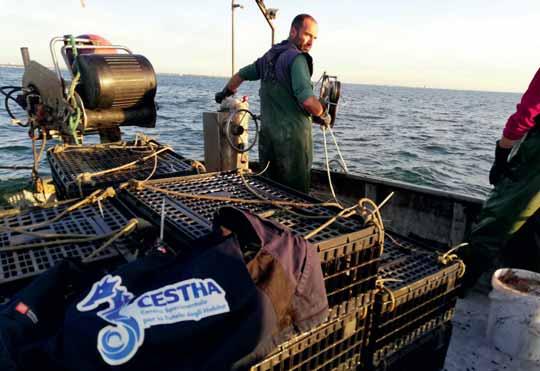
5 minute read
PRIZEFISH brings Italian and Croatian institutions together to improve fi sheries sustainability in the Adriatic
by Eurofish
PRIZEFISH brings Italian and Croatian institutions together to improve fisheries sustainability in the Adriatic
Technological innovation offers multiple benefits
Advertisement
The objective of the PRIZEFISH project is two-fold: to assist local fishing communities in the Adriatic develop value-added products that are innovative and sustainable; and to develop the cross-border trade in these products. The hope is that this will lead ultimately to an increase in the long-term economic, environmental, and social sustainability of communities in Adriatic coastal areas.
Headed by Alessia Cariani, Associate Professor at the University of Bologna, Interdepartmental Research Centre for Environmental Sciences (CIRSA) of Ravenna, PRIZEFISH is a project under the EU’s Interreg Italy - Croatia CBC Programme that is being implemented by a consortium including university and research institutes, small and medium fishing enterprises (SME), producer organisations (PO), territorial development bodies and non-profit organisations/NGOs from the Adriatic coastal regions of Italy and Croatia. The project has three specific objectives (SO), each associated with a work package (WP):
SO1. To improve the framework conditions for Adriatic fisheries and to develop technologies that enable them to be environmentally and economically sustainable. WP3 (piloting of sustainable and eco-certified fishery production) targets this specific objective.
SO2. To enable SMEs to produce eco-labelled added-value Adriatic seafood and to enhance the competitiveness of the sector by making it more sustainable, better managed, and more efficient than today. SO2 is achieved through WP4 (innovating tools and processes for added-value Adriatic fishery products). assessment and certification of Adriatic fishery products from a ‘responsible fishery’ under the environmental, social, and economic axes. Italian and Croatian fisheries (as combination of species/gears) were identified and selected based on their potential interest in a certification process and considering the selectivity of the fishing technique as well as the commercial value of the catch. Several consultation meetings with the relevant fishing operators were organised in both Italy and Croatia to verify this potential with stakeholders. The WP3 leader CNR-IRBIM developed the core of the certification process by setting three “key principles” (governance; environment; socioeconomic) for evaluating fisheries. The newly developed Adriatic Responsible Fisheries Management (ARFM) scoring system will be used to assess the full, partial, or non-compliance of a fishery with responsible management rules. WP3 will perform a preassessment of selected fisheries to
Under the framework of the PRIZEFISH project fishers test an innovative clam harvesting tool.
SO3. To increase Adriatic SMEs and POs competitiveness to penetrate EU/ non-EU seafood markets by filling the gap between fishery production and marketing of eco-labelled products. SO3 is targeted by WP5 (building up value chain and marketing of Adriatic eco-innovative fishery products).
Adriatic fisheries can apply for “responsible” certification
WP3 developed a set of standards and procedures for the
gain a first overview of their consistency with the ARFM standards as well to develop action plans to ameliorate their performance and fill the gaps evidenced in the preassessment. Specific surveys will be carried out among the fishery operators to verify the appeal of eco-labelled fisheries and products and to train the operators in the promotion, commercialisation, and marketing of sustainable products. As and when the standards are formally registered in the region, the ARFM certification programme will become operational in the Adriatic Sea. This will offer to Adriatic fishing SMEs the opportunity to add value to their products and, potentially, penetrate new markets and reach new consumers.
Using innovative technology to increase added value
Within WP4 three private producer organizations (POs), the Croatian Omega3 and Istra and the Italian Bivalvia, are applying innovative technologies to catch and process fish and shellfish species for the creation of innovative value-added products. Technologically innovative processes are also disseminated to Italian and Croatian fishermen through specifically designed trainings and workshops for SMEs. To reach the goal of fishing better (i.e. fishing less but selling at higher price!), the POs have conducted different pilot activities such as developing sea pumps for improved catching and handling of small pelagic fish (Omega3), innovative equipment for shrimp peeling (Istra), an innovative clam harvesting tool and cold chain process improvement (Bivalvia). These innovative approaches increased quality of the catches, positively affected the fishermen socially, improved fishing safety, as well as supported the welfare of target species by returning juveniles to sea. Moreover, new seafood products were created using advanced processing techniques to extend shelf life. These achievements will support logistic operations, bringing distant markets within reach while maintaining the products’ nutritional properties. Omega3 prolonged chilled sardine fillets’ shelf life by 4 days using ozone and MAP (argon and CO2 mixture), while Istra has prolonged the shelf life of chilled shrimpburgers to 15 days by treating them with high pressure processing (HPP). Bivalvia is innovating with clam products, testing the shelf life of ready-to-cook clams with tomato sauce also treated with HPP.
Studying consumer preferences and trends for better marketing
WP5 aims to analyse both the supply chain of Adriatic fishery products and consumer attitudes to traditional and innovative seafood. The supply and the demand side of the market will be analysed using secondary data (i.e. official time series of prices and quantities at production, trade, and retail level) and ad hoc surveys will be conducted with supply-chain actors and consumers. Consumers are consulted through online virtual rooms (a new approach replacing traditional focus groups in the Covid-19 era) and web interviews. Particular interest will be directed at the triangular trade network comprising Croatia, Italy, and Spain, the last being the main EU market for seafood products. Based on this preliminary data collection and analysis, and building on the results obtained in WP3 and WP4, ecoinnovative business models will be designed for at least three

The shelf life of these chilled shrimp burgers was prolonged to 15 days with the use of high pressure processing.
products (sardine fillets under an innovative modified atmosphere; clams and burgers/tartare of fish and crustaceans treated with high hydrostatic pressure technology), to identify new valorisation paths for local resources. Emphasis will be put on: innovative chain organisation and networks; branding and labelling strategies; processing and preparation; and distribution channels.
PRIZEFISH
Alma Mater Studiorum, University of Bologna Via Zamboni 33 Bologna, Italy
alessia.cariani@unibo.it +39 0544 937311 https://www.italy-croatia.eu/web/ prizefish
Project coordinator: Alessia
Cariani Start date: 01.01.2019 End date: 30.06.2021 Total budget: €3,120,000 ERF funding: €2,650,000
Croatian partners coordination and development of
Italian partners of Bologna (lead partner)
Institute for Biological Resources and Marine Biotechnologies – vices of Marche – ASSAM
Conservation – CESTHA










